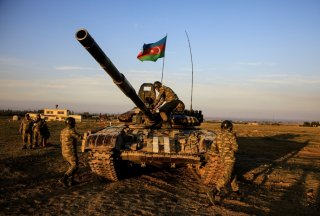The EU Must Hold Both Azerbaijan and Armenia Accountable
There is a problem when one combat video raises more international condemnation than a series of mass graves.
The EU’s condemnation this week of a video—released now but purportedly recorded a month ago—of Azerbaijani soldiers fighting Armenian civilians at a time when the two countries narrowly averted full-blown war was swift and clear: Azerbaijan must immediately investigate the incident. Yet with blame effectively apportioned before any such investigation, it is a reminder to those who have served and experienced war how the reality is so different from public perception.
The major wars of our lifetimes, including Bosnia, Iraq, Afghanistan, and Libya, in which the United States, Great Britain, and a handful of European allies have fought, have appeared at home on the evening news as though video games of laser-guided bombs dropped from planes at 30,000 feet. War is no video game. We see that in the more harrowing images from Ukraine. Similarly, the footage released by Armenia was close-up, hand-to-hand, and on the ground. It showed frightened young men on both sides.
When so few in the western world have experienced war, it is easy to understand why such imagery compels them to react and even take sides.
We also know from war that when the fighting stops, the shocking aftermath of what we find is, in some cases, even more horrifying. Just look to Ukraine ,where in recent days, mass graves have been discovered in Izyum, in addition to those already found in Bucha, as Kyiv’s forces advance and liberate territory. Bodies at first inspection appear to be civilian victims, many tortured. Those who committed these crimes should be held to account. And although these graves were relatively recent, there should be no statute of limitations on such atrocities.
Nor should there be in other conflicts. Yesterday, on the same day Armenia released their video of the purported Azerbaijani attack of a month ago, twenty-six bodies were uncovered, with the assistance of the Red Cross, from a mass grave in Azerbaijan. The graves, filled three decades ago, along with scores of other corpses found at other sites this year alone, are yielding some of the 4,000 still missing civilians unaccounted for from a war in the 1990s that saw Armenia occupy parts of Azerbaijan.
Until two years ago, when Azerbaijan recaptured the territories, the remains were untouched and out of reach for loved ones.
We must assume Russia was not expecting mass graves at Izyum and Bucha to be uncovered, for it was planning to hold those towns. Similarly, Armenia may never have anticipated the day Azerbaijan would unearth the graves they filled. Yet when Azerbaijan did recover its territory, the authorities in Armenia must have been aware that it would only be a matter of time.
The discovery makes the timing of the video release purporting to show Azerbaijani attacks on Armenians on the same day as the mass grave opening at least worthy of investigation. If the combat video is authentic, then it must have been filmed about a month ago. Why was it not made public before?
It could be a coincidence, but the video’s release diverted international attention from the mass graves dig. Indeed, while the EU spokesperson for foreign affairs demanded an immediate investigation by Azerbaijan into the purported crimes committed by its soldiers, there was zero call for any action from the Armenians in response to corpses unearthed from mass graves.
Azerbaijan’s Attorney General has announced a criminal investigation into the circumstances behind the video. If the footage is real, those responsible must be held to account. But accountability in the thirty-year conflict in the Caucasus is a double-edged sword, and Armenia must also be held to the same standards. More recent wrongdoing captured on video does not take away the criminality, nor should it divert attention from a thoroughly investigated, meticulously documented, but only today unearthed crime committed decades ago.
Indeed, there is a problem when one combat video raises more international condemnation than a series of mass graves. Instead, the West—from the EU to its partners, the United States, and the United Kingdom—must ensure that both sides come to terms with the horrors committed for generations. Only then can their people move on.
Mat Whatley is a British army veteran and former head of the Organization for Security and Cooperation in Europe (OSCE) in Donetsk, the EU Monitoring Mission in Georgia in the Caucasus, as well as former OSCE spokesman in then Yugoslavia.
Image: Reuters.

